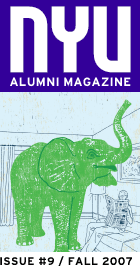sports
Good Call?
REFEREES MAY NOT BE ABOVE THE FRAY
by Andrew Flynn
As a longtime soccer referee, Mark Boyko (LAW ’05) is well acquainted with home field advantage: The home team simply wins more often. The reasons for this, however, are less clear. Do ultra-rowdy crowds, for which European soccer is famous, serve to rally the home team or intimidate the opposition? Boyko had a hunch that he, as referee, might actually be most affected by the cheering. “I thought,” he says, “if the referees are being influenced, then there’s a good chance that some are prone to influence more than others.”To find out, Boyko, while working on an LLM at the School of Law, teamed up with his brothers and fellow soccer referees—Adam, a postdoc in biological statistics and computational biology at Cornell, and Ryan, a research assistant in the psychology department at Harvard—to analyze data from the English Premier League’s games. Of all sports, soccer is one of the best poised for such a study because most of the subjective decisions are made by a single referee, allowing one individual’s judgment to hold ultimate weight over a match. The brothers published their findings in the September 2007 issue of Journal of Sports Sciences, and while not surprising, the results were clear-cut: Not only did home teams score more goals, but more penalties were awarded to visitors, suggesting that referees favor one over the other, perhaps because of the roaring fans. By controlling for other factors and tallying the penalty calls of individual referees, the Boykos also discovered that some may be more biased than others, or have different “bias levels,” but that this decreases with experience.
For Arnold Klein, however, the study has little to do with his calls on the field. A 34-year veteran of refereeing,who has officiated both NCAA Division I and international matches, Klein insists he feels neither pressure from spectators nor partiality for either side. “When I go out on the field, I see two colors,” he says.“I don’t know who’s the home and who’s the visiting team.” And Klein prefers boisterous crowds: “I don’t like when the atmosphere is like in a church or a concert hall.”
Boyko admits other critics have had similar reactions. “Nobody thinks that they are being influenced by the crowd,” he says, “which is why we think that this is a subconscious, almost biological thing.” In fact, researchers have recently noted higher levels of testosterone in home team athletes, and Boyko predicts future studies might explore the psychology and biochemistry of individual referees for all sports.
Regardless, Boyko hopes that officials will consider referees’ bias, especially when they assign them to key matches.“If you have a competition where you are only going to play one championship game, and it’s going to be at one of the teams’ home stadiums,” he says, “maybe you wouldn’t want to be using the referee with the highest home field advantage.”







